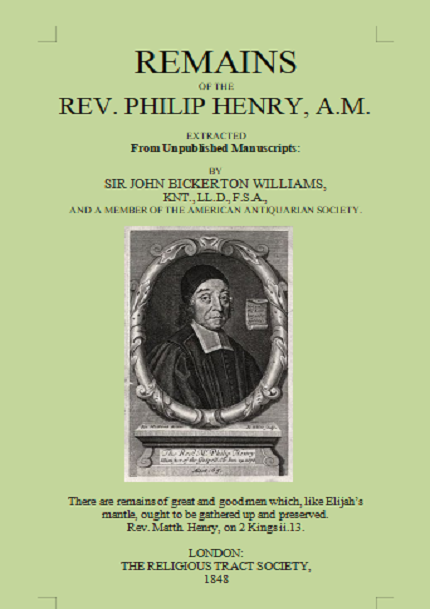By Sir John Bickerton Williams.

Remains of the Rev. Philip Henry, A.M.
Extracted from unpublished Manuscripts.
By Sir John Bickerton Williams.
There are remains of great and good men which, like Elijah’s mantle, ought to be gathered up and preserved.
Rev. Matth. Henry, on 2 Kings ii.13.
Preface of Remains of the Rev. Philip Henry:
Those who are conversant with the “Life” of that eminent servant of God, the Rev. Philip Henry, are, probably, familiar with its tenth chapter, containing “A Miscellaneous Collection of his Sayings, Observations, Counsels, and Comforts out of his Sermons, Letters, and Discourses.”
In the enlarged edition of the Life, published in 1825, that “Collection”* was considerably increased.
Since then, one of Mr. Henry’s descendants, John Lee, esq., made public an Exposition by his ancestor, with practical observations on the frst eleven chapters of the book of Genesis; and also “Selections” from some of his Diaries and Common Place Book.
* Mr. Henry’s “Notes” on the whole book, in his own handwriting, are in my
possession.
Miss Sarah Lawrence, author of “Stories from the History of Greece,” another of the family, published, in the year 1844, “The Descendants of P. Henry, M.A.,” with an Appendix containing an extract from one of his Letters, and very interesting transcripts from some of his interleaved Almanacs.
Besides the Memorials thus alluded to, eighteen of our author’s Sermons were published by myself, A. D. 1816, from his own manuscripts; and since, as an “Appendix” to the octavo edition of the “Miscellaneous Works” of his son, the celebrated Commentator, a course of “Sermons on what Christ is made to Believers in Forty Real Benefts.”
In the year 1834, Mr. T. Auman, a London bookseller, put forth a volume of “Skeletons” by the same hand.
Others of them have been preserved in the Evangelical and Congregational Magazines. Manuscripts, however, still remain; and the following attempt to rescue a portion of them from the oblivion to which writings are specially exposed, will, I trust, be approved. And the rather, because the good man, owing to an extreme modesty, published nothing.
The ensuing pages have been transcribed either from Mr. Henry’s own handwriting; or his son’s; or his eldest daughter’s, Mrs. Savage; except in three instances only: and in those the copies were made from some manuscript sermons, “taken out of his own notes.”
Mrs. Savage’s life, which frst appeared in the year 1818, specially notices her habit of preserving what she heard delivered from the pulpit; and likewise of copying not a few discourses from the originals borrowed for the purpose.
To the “last Exposition,” with which the present collection closes, an explanatory statement is prefxed.
Although what is thus brought to light has been partially divested of a sermonic character, no freedoms have been taken with the manuscripts, except such as it is believed the venerated writer himself would have sanctioned with a view to the press: the omission too, occasionally, of familiarisms; the avoidance of redundant expressions; and the introduction of a word now and then, when necessary to make a sentence complete.
All, therefore, the reader may feel assured, is genuine, and, as exhibited, entire: “collected,” in fact, after the fashion propounded by lord Bacon in his “Advancement of Learning;” and noticed in archdeacon Hakewill’s elaborate Discourse on the Power and Providence of God, fol. 1630, p. 237.
Every part of the volume, while furnishing an instructive specimen of plain and practical preaching, is a valuable illustration of the favorite maxim of this admirable theologian— that a good textuary is a good divine. And the one and the other are the more impressive, because the display, after all, is merely that of hisordinary doings.
Mr. Henry was born at Whitehall, Westminster, August 24, 1631. He was educated at Westminster School, under Dr. Busby, and then at Christ Church, Oxford. And, having made full proof “of his ministry,” died at Broad Oak, near Whitchurch, in Shropshire, on the 24th of June, 1696, in his sixty-ffth year. He has ever been regarded as one of the best scholars, as one of the most judicious Christians, and as one of the most polished gentlemen, of his day.
John Bickebtoit Williams.
The Hall, Wem, July 27, 1848
Looking for a Hardcover or Paperback?
For those who want to have a hardcover or a paperback of this book, I want to suggest you to look here.